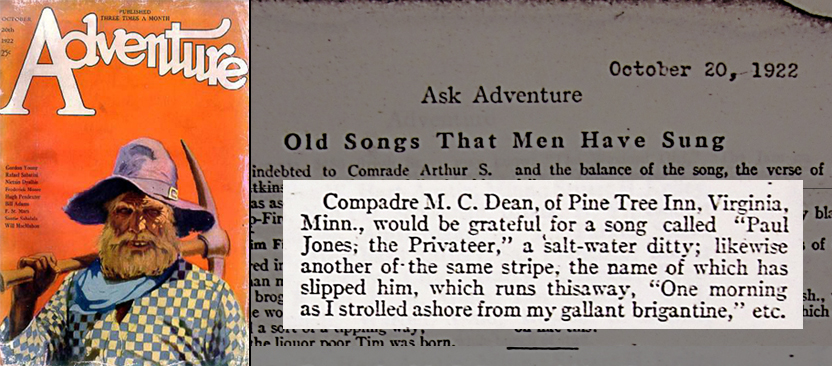Riley and I Were Chums
One day as I went out for a walk, myself and my chum Johnny Riley,
The air it being kind of damp and the weather rather dryly,
Just then the cop caught me by the ear he says, “Young man there’s a warrant here,”
And I took the warrant with the greatest of fear and I handed it over to Riley. -Chorus
One day I picked up a watch and chain going out with my chum Johnny Riley,
Riley always looked for his share, he was so awfully wily,
But as by a lamp we chanced to pass, it’s then I saw by the glimmer of the glass,
That the watch was gold but the chain was brass so the chain went over to Riley. -Chorus
Last Saturday night I married a wife and my best man there was Riley,
I thought she’d be the joy of my life, she looked so very shyly,
But soon I found it was no fun, one day she chased me with a gun,
I said, “Now madam, with you I’ve done” and I handed her over to Riley. -Chorus
After an inspiring week of music at the All Ireland Fleadh this past month, I had the chance to spend a day at the amazing Irish Traditional Music Archive on Merrion Square in Dublin. There, I dove into the ITMA’s incredible collection of field recordings from Newfoundland made in the 1970s by Aidan O’Hara. The ITMA recently launched a digital exhibition of O’Hara’s Newfoundland material on its website that I highly recommend checking out. This month’s song is one that you can listen to directly from their website—easier (though less fun) than a trip to Dublin!
I was delighted to come upon O’Hara’s recording of Newfoundlander Frankie Nash giving a spirited rendition of this comic song! I encountered it first several years ago as performed by Crandon, Wisconsin traditional singer Robert Walker who was recorded by Sidney Robertson Cowell in 1937. Walker’s version (available here) is nice but to me it is Nash really brings “Riley” to life. Digging around online, I was also happy to discover that the New York Public Library has unearthed and digitized an 1892 song sheet version titled “I Handed it Over to Riley” which you can also access online. In Newfoundland, the song is attributed to local songsmith Johnny Burke. NYPL’s song sheet, and the style of the song itself, would seem to suggest that it most likely originated on the stage (the composers are listed as Albert Hall and Felix McGlennon) and was then, like many stage songs, adapted into tradition by others.
Interestingly, the Newfoundland, Wisconsin and song sheet versions of this song all have rather distinct melodies from one another. The above transcription is based on the Newfoundland melody though I drew on all three versions to fill out the text.





